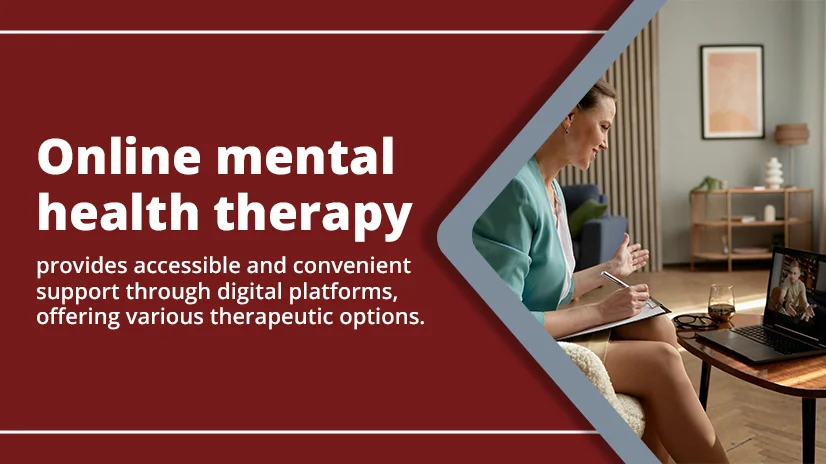
Online Mental Health Therapy Explained
In today’s digital age, accessing mental health support has become more convenient than ever. Online mental health therapy offers individuals the opportunity to receive professional mental health services from the comfort of their own homes.
This mode of therapy utilizes video calls, phone calls, or even text-based communication to connect clients with licensed therapists and counselors. Keep reading as we explore what online mental health therapy is, covering its different aspects.
Key Takeaways
Online mental health therapy provides accessible and convenient support for individuals facing mental health conditions. This article covers:
- Various options, such as video counseling and text-based therapy, cater to different preferences and needs.
- Online therapy follows a structured process designed to support individuals in managing their mental well-being effectively.
- While beneficial, virtual therapy also presents challenges and limitations that individuals and therapists need to consider.
Contact Indiana Center for Recovery at (844) 650-0064 to explore how our mental health services can help you achieve mental wellness.

Introduction To Online Mental Health Therapy
Online mental health therapy, also known as teletherapy or telehealth counseling, refers to the provision of mental health services through different digital platforms such as video calls, phone calls, or messaging apps. This method allows individuals to receive therapy from mental health counselors and therapists remotely, using their computers or smartphones.
The concept of online therapy began in the late 20th century with the rise of the internet. Initially, it was limited to email exchanges and chat rooms. However, now it has expanded to include real-time interactions through secure video platforms. The COVID-19 pandemic further accelerated its adoption, highlighting its convenience and accessibility.
The importance of online mental health therapy lies in its ability to overcome obstacles such as geographical distance, mobility constraints, and stigma associated with in-person therapy sessions. It allows an individual to easily access mental health providers from the comfort of home, fostering a more flexible and safe space for therapy sessions.
Types Of Online Mental Health Therapy
Online mental health therapy offers various formats to cater to individual needs and preferences. These types may include the following:
Video Counseling
Video counseling involves real-time sessions with a therapist through a video call platform. This type of therapy closely mimics traditional in-person therapy, allowing for face-to-face interaction and non-verbal communication. The video chat option is beneficial for those who prefer seeing their therapist and value the personal connection it provides. It also provides flexibility in scheduling and eliminates the need for travel.
Text-Based Therapy
Text-based therapy allows individuals to communicate with their therapist through text messages. This form of therapy is convenient for those who may find it difficult to express themselves verbally or prefer writing down their thoughts. Text-based therapy provides a record of the conversation that clients can review later. It is also accessible and can be done at any time, making it a flexible option for those with a busy schedule.
Phone Therapy
Phone therapy involves talking to a licensed therapist over the phone. This type of therapy is suitable for individuals who may not have access to reliable internet for video calls or prefer the privacy of a phone conversation. Phone therapy allows for a more personal connection than text-based therapy while still providing the convenience of remote sessions. It is also a good option for those who may feel anxious about being on camera.
Self-Guided Programs
Self-guided programs provide individuals with resources and tools to manage their mental and emotional health at their own pace. These programs often include modules, exercises, and activities designed to help people develop coping skills and strategies. Self-guided programs can be a good option for those who prefer a more independent approach to mental health care or who want to supplement other forms of therapy.
Group Therapy Sessions
Group therapy sessions involve multiple participants who share their experiences and support each other under the guidance of an online therapist. These sessions can take place through video calls or chat platforms. Group sessions offer a sense of community and can help individuals feel less isolated in their struggles. They also provide different perspectives and insights that can be beneficial for personal growth and healing.
Benefits Of Online Mental Health Therapy
Online mental health therapy offers numerous advantages that make it an attractive option for many people. Here are some of these benefits:
Accessibility And Convenience
One of the main advantages of online mental health therapy is its accessibility and convenience. People can access therapy from anywhere with an internet connection, eliminating the need to travel to a therapist’s office. This is the best option for those living in remote and rural areas or with limited mobility. Online therapy allows people to receive mental health help from the comfort of their own homes, making it easier to fit into busy schedules.
Affordability
Online mental health therapy is often more affordable than traditional in-person therapy. Many online therapy platforms offer lower rates or subscription plans, making mental health support more accessible to individuals with varying financial situations. Additionally, the cost savings from not having to commute to a therapist’s office can add up over time, making online therapy a cost-effective option for many.
Anonymity And Privacy
Anonymity and privacy are significant benefits of online mental health therapy. Many individuals feel more comfortable discussing sensitive issues when they know their identity is protected. Online therapy platforms often allow users to choose how much personal information they share. This can help lessen the stigma associated with seeking mental health support and encourage more people to seek professional help.
Flexibility In Scheduling
Another significant benefit of online mental health therapy is scheduling flexibility. With a variety of appointment times available, including evenings and weekends, clients can schedule sessions that fit their busy lives. This flexibility is particularly useful for those with irregular work hours or family commitments. It also means that therapy can continue uninterrupted even if a client relocates or travels frequently.
Variety Of Available Therapies
Another benefit of online mental health therapy is the variety of available therapies. Individuals can choose from different types of therapy, such as cognitive-behavioral therapy (CBT), mindfulness-based therapy, and more. Best online therapy platforms often have a wide range of qualified therapists with diverse specialties and approaches, making it easier for individuals to find the right match for their specific needs and preferences.
The Process Of Online Mental Health Therapy
Online mental health therapy follows a structured process that helps individuals receive effective support and treatment. Let’s explore the steps involved:
How To Choose The Right Platform
Choosing the right online mental health therapy platform is crucial for a positive therapy experience. Consider factors such as the therapist’s qualifications, types of therapy offered (e.g., video counseling, text-based therapy), pricing and insurance options, user reviews, and the platform’s security and privacy policies. Finding an online platform that meets your needs and preferences can enhance the effectiveness of your therapy.
Initial Consultation And Assessment
The initial consultation and assessment are essential steps in online therapy. During this stage, the therapist gathers information about your mental health and substance use history, current concerns, and goals for therapy. This helps the therapist understand your needs and tailor the treatment plan accordingly. It’s also an opportunity for you to ask questions and discuss any concerns you may have about the therapy process.
Setting Goals And Creating A Treatment Plan
After the assessment, you and your therapist will work together to set goals for your therapy journey. These goals will guide the direction of your treatment and help measure your progress. Together, you will create a treatment plan that outlines the steps you will take to achieve your specific goals. This plan may include specific therapy techniques, exercises, and strategies tailored to address your individual challenges and strengths.
Regular Sessions And Progress Tracking
Regular therapy sessions are scheduled based on the treatment plan. These therapy sessions can occur weekly, biweekly, or according to a schedule that works best for the individual. During sessions, the therapist and client discuss ongoing challenges, progress made toward goals, and any adjustments needed to the treatment plan. Progress tracking helps ensure that therapy remains effective and beneficial.
Importance Of Follow-Up And Evaluation
Follow-up and evaluation are critical components of online mental health therapy. Your therapist or counselor will conduct periodic evaluations to assess your real progress and determine if adjustments to your treatment plan are necessary. Follow-up sessions allow you to address any new concerns or issues that may arise during your therapy journey, ensuring continuous support and improvement in your mental health.
Challenges And Limitations Of Online Therapy
While beneficial, online mental health therapy also presents several challenges and limitations that individuals should consider. Let’s explore these challenges:
Technology And Internet Access
Access to reliable technology and an internet connection is crucial for successful online therapy sessions. Technical issues like poor internet connectivity or glitches in video conferencing platforms can disrupt sessions and affect communication between the client and therapist. It’s important to ensure that both parties have the necessary equipment and a stable internet connection to minimize disruptions.
Lack Of Non-Verbal Communication
Unlike in-person therapy, online mental health therapy may lack some aspects of non-verbal communication, such as facial expressions, body language, and eye contact. These factors can offer valuable insights into a client’s emotions and reactions, which may be more challenging to interpret during virtual sessions. Therapists and clients may need to find alternative ways to convey and understand non-verbal cues effectively.
Licensing And Regulatory Issues
Online mental health therapy raises unique licensing and regulatory challenges. Therapists must adhere to state licensing laws, which can vary significantly across different states. Providing therapy to clients in states where the therapist is not licensed or registered can create legal and ethical complications. Navigating these regulations is necessary to ensure compliance and protect both therapists and clients.
Security And Privacy Concerns
Security and privacy are critical considerations in online mental health therapy. Clients may worry about the confidentiality of their personal information and therapy sessions when using digital platforms. Ensuring secure communication channels, data encryption, and compliance with privacy laws (such as HIPAA in the United States) are essential to protecting clients’ privacy and building trust in online therapy services.
Efficacy Compared To In-Person Therapy
There is ongoing debate about the efficacy of online therapy compared to traditional, in-person therapy sessions. While research supports the effectiveness of online therapy for many individuals, some people may still prefer face-to-face interactions for a more personal therapeutic experience. Factors such as therapeutic alliance, treatment outcomes, and client satisfaction may vary between online and in-person modalities.
Frequently Asked Questions (FAQ)
Does online therapy actually work?
Online therapy has been shown to be effective for many people. Numerous studies have indicated that it can produce positive outcomes similar to traditional in-person therapy for various mental health concerns. Online therapy offers convenience, accessibility, and flexibility, allowing individuals to receive support from licensed therapists through video calls, messaging, or phone sessions. However, the effectiveness of online therapy can vary depending on the individual’s needs, the type of therapy provided, and the quality of the therapeutic relationship established.
What to do if someone is mentally unstable and won’t get help?
If someone you know is mentally unstable and won’t seek professional help, it’s essential to express your concern and offer support. Encourage them gently to talk to a trusted person, such as a family member, friend, or counselor. Let them know you’re there to listen without judgment. If they’re in immediate danger, consider contacting a mental health expert or crisis hotline for guidance on how to help them. It’s crucial to respect their autonomy while encouraging them to consider the benefits of seeking professional support for their well-being.
Online Mental Health Therapy with Indiana Center For Recovery
Online therapy can make care more convenient without sacrificing quality, and at Indiana Center for Recovery we combine virtual sessions with comprehensive mental health treatment so you get assessments, evidence-based interventions, and medication management even when you’re remote. Licensed therapists deliver video, phone, or messaging visits tailored to your needs, and if symptoms intensify we can transition into inpatient psychiatric services for stabilization or keep you connected through outpatient treatment as you continue virtual care; integrated dual diagnosis treatment makes sure any co-occurring substance use is addressed alongside your mental health.
Our mental health treatment centers across Indiana offer judgment-free, evidence-based programs that now include teletherapy & virtual access so support is available even when you can’t make it onsite. Call us right now at (844) 650-0064 to confirm your preferred modality and get started with an online plan that fits your life.



 100% Confidential
100% Confidential
